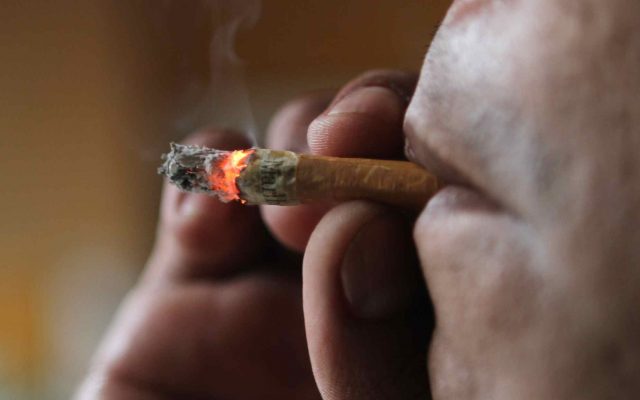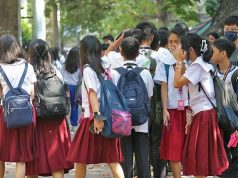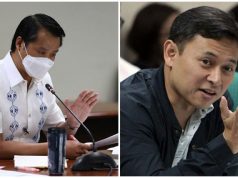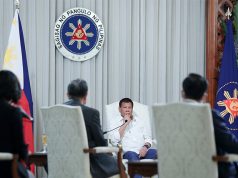
MANILA – The Executive is open to using its proposed tax hike on sugar-sweetened beverages (SSB) as a bargaining chip just to get the Senate nod for the House-approved scheme to impose an additional P6 excise tax on gasoline and diesel, a key plank of the tax reform package eyed for passage by yearend.
The chairman of the Senate ways and means committee, Senator Juan Edgardo Angara revealed this Thursday as he discussed how Executive and Legislative officials recently sat down with a view to facilitate approval of the Duterte administration’s Tax Reform for Acceleration and Inclusion (TRAIN) package. The President had pointedly asked the Senate to pass the House-approved package when he delivered his State of the Nation Address (SONA) on July 24.
Meanwhile, three former health secretaries – Esperanza Cabral, Enrique Ona and Jaime Galvez Tan – are pressuring the Executive and lawmakers to include tobacco and alcohol tax hikes in the TRAIN, saying they were dismayed that such measures were not contemplated, when the evidence linking smoking and liquor to top diseases continues to rise.
Angara presided Thursday at his committee’s hearing on the TRAIN bill, and was interviewed at the sidelines.
He said Finance Secretary Dominguez “was indicating they might be willing to trade the SSB but in exchange for full passage of the higher excise tax on fuel products.” Angara meant the P6 fuel tax hike that the House approved before the recess last May. The House formula is to implement the tax hike in increments: P3 for 2018, P2 in 2019 and P1 for the third year.
Some senators had said earlier they would rather tweak the formula to reverse it to 1-2-3. Their logic: it’s best not to shock the market with a whopping hike right on the first year.
As for the possible tradeoff of the sugar tax with fuel tax, Angara recalled telling Dominguez they would have to revisit the options.
He indicated there was nothing firm yet on the potential compromise: “Not yet. we are still at the discussion point. It was just raised by the Finance Secretary…like what do you think?”
Why exclude sin tax hikes?
At a forum on Tuesday, Cabral, Ona and Galvez Tan united with physicians, health organizations and civil society organizations to support the inclusion of higher cigarette tax in the tax reform measure being pushed in the Senate to address two of the most pressing health problems in the country — tobacco use and malnutrition.
How about cigarette taxes?
In a press conference held at Annabel’s Restaurant in Tomas Morato, Quezon City, petitions were signed to urge senators and the government through President Rodrigo Duterte to include cigarette tax in the deliberations on tax reforms.
Cabral said tobacco exposes smokers to about 45 life-threatening diseases — stroke, heart attack, lung cancer and chronic lung disease, to name a few.
“In addition, tobacco predisposes (one) to a major health problem: illicit drug use. Of 4.5 million Filipinos who have ever tried drugs, 1.5 million used tobacco as the gateway,” Cabral said, noting that the comprehensive tax reform bill currently in the Senate should be converted to a version that is pro-poor.
Galvez-Tan, expressed surprise that tobacco and alcohol taxes were not included when the TRAIN bill was proposed. “We contacted the Department of Finance when the TRAIN came out. I was surprised that tobacco and alcohol taxes were not there. Actually, I was telling the Finance Group that it is the more sustaining aspect of our taxes in the Philippines. We have not taxed tobacco and alcohol (in the same rate as other countries) if we compare ourselves to Hongkong, Thailand, and even Singapore,” he said. In these places, he said, a stick of cigarette costs P20, compared to P5 in the Philippines.
Cabral listed proposed amendments: “We urge that taxes on tobacco be increased by 60 percent in 2018, and by 10 percent yearly thereafter with the following goals — to decrease the number of current smokers from 14.5 million to 13.5 million; to reduce annual financial losses of at least PHP210 billion pesos from smoking-related diseases; to augment funds for universal health care, government infrastructure projects, and crop diversification by tobacco farmers; and to institute tobacco control as a preventive measure against the use of illicit drugs,” she said.
Ona was glad that health care advocates came together to call the attention of the government.
“Dahil hindi number 2 or number 3 ang health. Dahil kung number one man ang infrastructure, number one man ang criminality, number one din ang health (Health is not number 2 or number 3. If infrastructure and criminality are number 1, so is health),” he said.
Ona urged legislators to understand the dream of Universal Health Care (UHC) for the people wherein funds from the sin tax should be used to finance the health care system.
The government, he said, should also continue to find ways to improve the implementation of UHC and keep on finding other sources of funds to finance it.
Meanwhile, Dr. Antonio Dans, a convener of the Sin Tax Coalition and professor of the University of the Philippines College of Medicine, estimated that there will be 1 million more smokers in the country by the end of President Rodrigo Duterte’s term in 2022 if the delay in the adjustment of the tobacco tax prevails.
“That’s 200,000 new smokers for every year that we delay a tax adjustment on tobacco, and these new smokers will be composed of mostly rural residents — the young and the poor,” he added.
Framework Convention on Tobacco Control Alliance Philippines (FCAP) and Action on Smoking and Health (ASH) Philippines executive director, Dr. Maricar Limpin, said the proposed TRAIN bill also includes taxation on sugar-sweetened beverages.
“We are supporting the tax on SSB because we believe that it will address the double burden on malnutrition,” said Limpin, referring to obesity and chronic undernutrition.
The petitions will be forwarded to the Philippine Medical Association before they are sent to incumbent Health Secretary Dr. Paulyn Ubial, with the aim of getting her full support.









